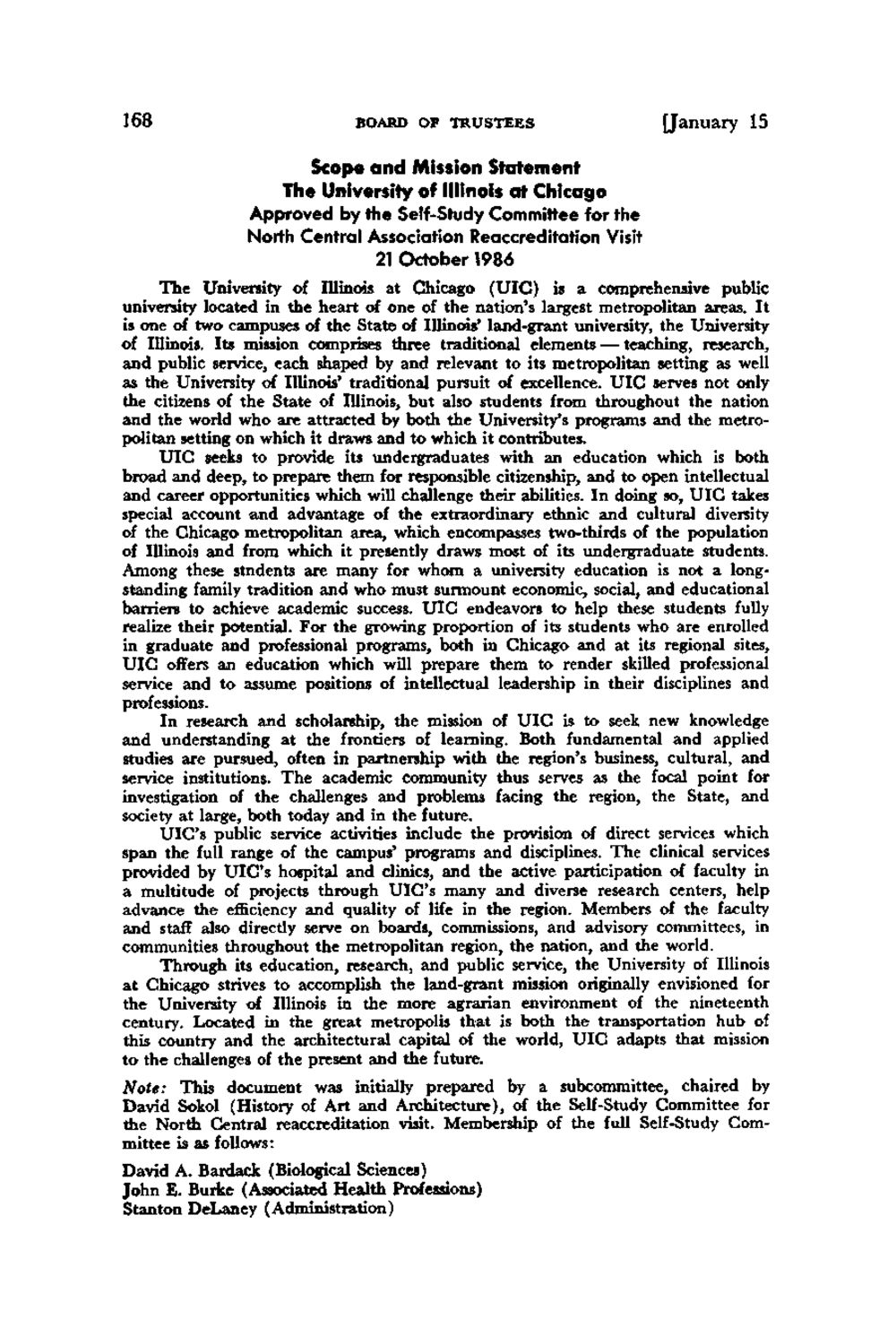| |
| |
Caption: Board of Trustees Minutes - 1988
This is a reduced-resolution page image for fast online browsing.

EXTRACTED TEXT FROM PAGE:
168 BOARD OF TRUSTEES (January 15 Scope and Mission Statement The University of Illinois at Chicago Approved by the Self-Study Committee for the North Central Association Reaccreditation Visit 21 October 1986 The University of Illinois at Chicago (UIC) is a comprehensive public university located in the heart of one of the nation's largest metropolitan areas. It is one of two campuses of the State of Illinois' land-grant university, the University of Illinois. Its mission comprises three traditional elements — teaching, research, and public service, each shaped by and relevant to its metropolitan setting as well as the University of Illinois' traditional pursuit of excellence. UIC serves not only the citizens of the State of Illinois, but also students from throughout the nation and the world who are attracted by both the University's programs and the metropolitan setting on which it draws and to which it contributes. UIC seeks to provide its undergraduates with an education which is both broad and deep, to prepare them for responsible citizenship, and to open intellectual and career opportunities which will challenge their abilities. In doing so, UIC takes special account and advantage of the extraordinary ethnic and cultural diversity of the Chicago metropolitan area, which encompasses two-thirds of the population of Illinois and from which it presently draws most of its undergraduate students. Among these stndents are many for whom a university education is not a longstanding family tradition and who must surmount economic, social, and educational barriers to achieve academic success. UIC endeavors to help these students fully realize their potential. For the growing proportion of its students who are enrolled in graduate and professional programs, both in Chicago and at its regional sites, UIC offers an education which will prepare them to render skilled professional service and to assume positions of intellectual leadership in their disciplines and professions. In research and scholarship, the mission of UIC is to seek new knowledge and understanding at the frontiers of learning. Both fundamental and applied studies are pursued, often in partnership with the region's business, cultural, and service institutions. The academic community thus serves as the focal point for investigation of the challenges and problems facing the region, the State, and society at large, both today and in the future. UIC's public service activities include the provision of direct services which span the full range of the campus' programs and disciplines. The clinical services provided by UIC's hospital and clinics, and the active participation of faculty in a multitude of projects through UIC's many and diverse research centers, help advance the efficiency and quality of life in the region. Members of the faculty and staff also direcdy serve on boards, commissions, and advisory committees, in communities throughout the metropolitan region, the nation, and the world. Through its education, research, and public service, the University of Illinois at Chicago strives to accomplish the land-grant mission originally envisioned for the University of Illinois in the more agrarian environment of the nineteenth century. Located in the great metropolis that is both the transportation hub of this country and the architectural capital of the world, UIC adapts that mission to the challenges of the present and the future. Note: This document was initially prepared by a subcommittee, chaired by David Sokol (History of Art and Architecture), of the Self-Study Committee for the North Central reaccreditation visit. Membership of the full Self-Study Committee is as follows: David A. Bardack (Biological Sciences) John E. Burke (Associated Health Professions) Stanton DeLaney (Administration)
| |